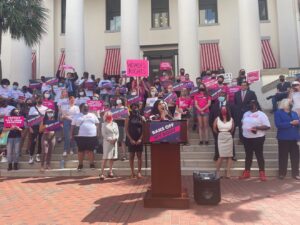
Last September, Florida Republican Rep. Webster Barnaby filed HB 167, which is an abortion ban similar to Texas’ new abortion law. If Florida lawmakers agree to pass this bill, access to abortion throughout the state will drastically change as more states continue to chip away at Roe v. Wade.
The bill seeks to ban all abortions after 15 weeks of pregnancy, with exceptions in cases of serious medical emergencies or fatal danger concerning the mother or fetal abnormalities. However, there are zero exceptions for incest or rape cases. Along with limiting access to abortion, the bill would also change the language surrounding the “fetus” to “unborn child,” which linguists at NPR have suggested leans toward anti-abortion groups.
In an attempt to push back against Florida lawmakers who are seeking to enact the ban, Floridians for Reproductive Freedom and similar organizations like Dignity Power and Planned Parenthood Generation Action gathered at the Capitol to share their opposition to the bill. Politicians like Rep. Anna Eskamani and Sen. Shevrin Jones have shown an interest and passion for protecting reproductive rights. They were present at the press conference alongside those who attended the rally.
“When we look at abortion as an issue, it isn’t an issue — it’s healthcare,” Eskamani said at the press conference. “Abortion is healthcare. So, how dare you strip away our rights in this new piece of policy, which is a direct assault to the protections offered by Roe v. Wade.”
Eskamani continued to share the financial and emotional exhaustion that would impact those who need access to abortions.
“When you get through North Carolina, you have to go through their 17-hour wait period, so you can imagine the cost associated with that. The time off of work, the transportation barriers, the language barriers — it was mentioned already today, but abortion bans affect every type of person. But those who are poor, people of color, undocumented, don’t speak English and disabled, they’re the ones who are going to be deeply impacted because they will have nowhere to go.”
According to Planned Parenthood and the Guttmacher Institute, the closest clinic capable of providing an abortion would be located in North Carolina if Roe v. Wade is overturned by the U.S. Supreme Court and Florida.
In a video shared by state Agriculture Commissioner Nikki Fried on her Facebook page, she deemed Gov. Ron DeSantis as a contradictory figure who isn’t clear about his definition of freedom.
“Governor DeSantis loves to say that Florida is a ‘free state,’ but this extreme bill would take away women’s freedom to make decisions about our bodies and our futures — even in cases of rape or incest,” she said. “It’s yet another dangerous, authoritarian power grab by Florida Republicans and a disgusting insult to the dignity of women across Florida. We will fight this every step of the way.”
As the second week of legislation comes to a close, the first House committee voted 12-6 on Wednesday, Jan. 19, to move the bill forward to its next two hearings. Its companion bill, SB146, was filed shortly after the House bill by Senate Appropriations Chair Kelli Stargel. Both bills are likely to be a predecessor for the 2022 midterm elections to control Congress.